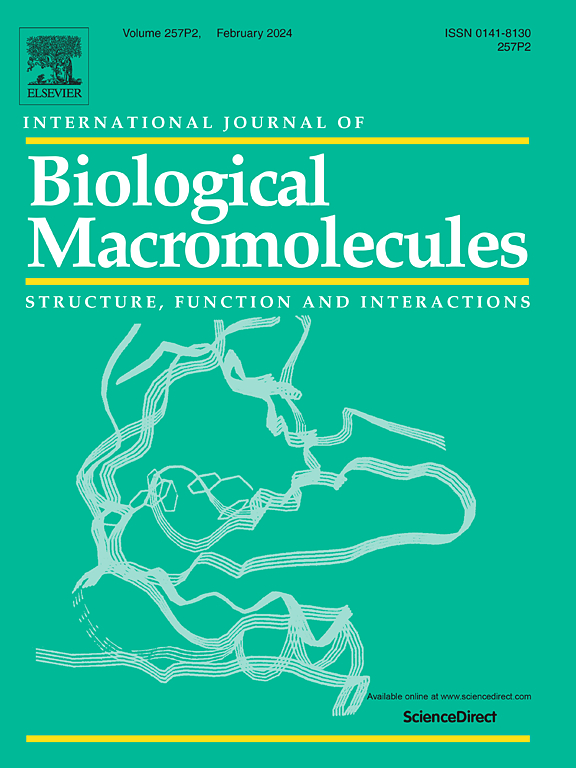Recent advance on the antibacterial activity of polysaccharide-based conjugates
IF 8.5
1区 化学
Q1 BIOCHEMISTRY & MOLECULAR BIOLOGY
International Journal of Biological Macromolecules
Pub Date : 2025-06-01
DOI:10.1016/j.ijbiomac.2025.144760
引用次数: 0
Abstract
Polysaccharide has attracted global attention because of its potential application as an alternative to antibiotics to alleviate antibiotic resistance and drug residue caused by antibiotic abuse, but its relatively low antibacterial activity and narrow antibacterial spectrum cannot meet the needs of daily life and clinical treatment. Apart from chemical, physical, and biological modifications, conjugation with other bioactive compounds via covalent or non-covalent interactions can not only improve the antibacterial activity and reduce the bacterial resistance of polysaccharide-based conjugates, but also expand the antibacterial spectrum and reduce the cytotoxicity of polysaccharide-based conjugates. Then, a systematic and up-to-date overview of the conjugation strategies aimed at enhancing the antibacterial activity of polysaccharides will guide the future development of polysaccharide conjugates with enhanced antibacterial properties. Therefore, in this study, the conjugation of polysaccharides with protein, polyphenol, essential oil, organic acid, polyvinyl, antibiotic, and other bioactive compounds was investigated to improve the antibacterial activity of polysaccharide-based conjugates, thereby demonstrating the potential action mechanism of polysaccharide-based conjugate. Meanwhile, existing problems and future prospects for the development and application of polysaccharide-based conjugates with good antibacterial activities are suggested. This study could provide guidance for adopting conjugation to improve the antibacterial activity and application of polysaccharides.
多糖基缀合物抗菌活性研究进展
多糖作为抗生素的替代品,有望缓解抗生素滥用造成的抗生素耐药和药物残留问题而受到全球关注,但其抗菌活性相对较低,抗菌谱较窄,无法满足日常生活和临床治疗的需要。除了化学、物理和生物修饰外,通过共价或非共价相互作用与其他生物活性化合物偶联不仅可以提高多糖基偶联物的抗菌活性,降低细菌耐药性,而且可以扩大多糖基偶联物的抗菌谱,降低多糖基偶联物的细胞毒性。然后,对旨在提高多糖抗菌活性的缀合策略进行系统的和最新的综述,将指导未来具有增强抗菌性能的多糖缀合物的开发。因此,本研究对多糖与蛋白质、多酚、精油、有机酸、聚氯乙烯、抗生素等生物活性化合物的偶联进行了研究,以提高多糖基偶联物的抗菌活性,从而揭示多糖基偶联物的潜在作用机制。同时,对具有良好抗菌活性的多糖基偶联物存在的问题及未来的开发应用前景进行了展望。本研究可为采用偶联法提高多糖的抗菌活性和应用提供指导。
本文章由计算机程序翻译,如有差异,请以英文原文为准。
求助全文
约1分钟内获得全文
求助全文
来源期刊
CiteScore
13.70
自引率
9.80%
发文量
2728
审稿时长
64 days
期刊介绍:
The International Journal of Biological Macromolecules is a well-established international journal dedicated to research on the chemical and biological aspects of natural macromolecules. Focusing on proteins, macromolecular carbohydrates, glycoproteins, proteoglycans, lignins, biological poly-acids, and nucleic acids, the journal presents the latest findings in molecular structure, properties, biological activities, interactions, modifications, and functional properties. Papers must offer new and novel insights, encompassing related model systems, structural conformational studies, theoretical developments, and analytical techniques. Each paper is required to primarily focus on at least one named biological macromolecule, reflected in the title, abstract, and text.

 求助内容:
求助内容: 应助结果提醒方式:
应助结果提醒方式:


